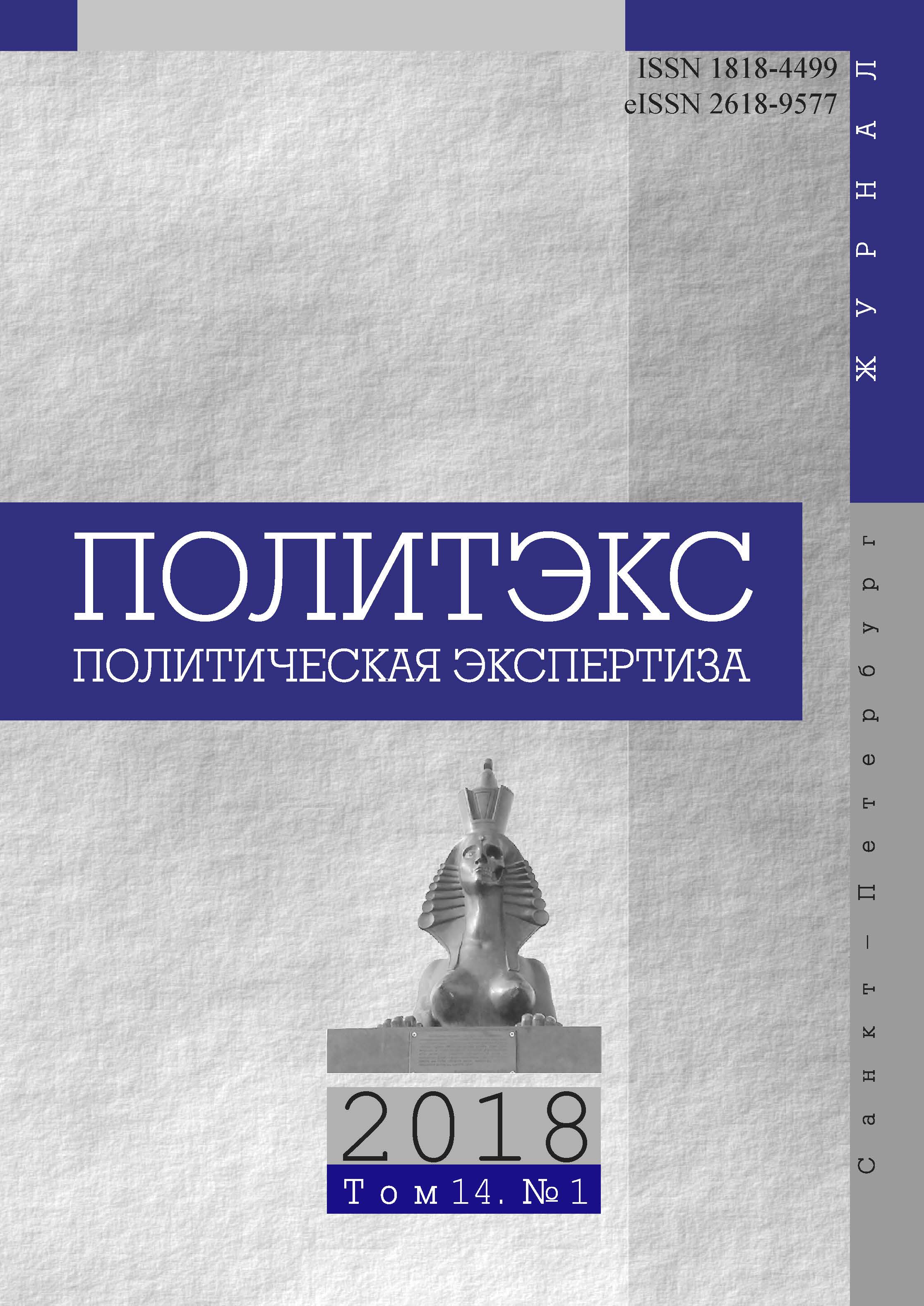FRAGMENTS OF EMPIRES: SIGNS AND CAUSES OF THE POST-IMPERIAL COUNTRIES PARTIAL STATEHOOD
Part I
DOI:
https://doi.org/10.21638/spbu23.2018.113Abstract
The article is devoted to the substantiation of the allegation that the state of post-imperial countries is partial. The phenomenon of empire is considered in the framework of the geopolitical paradigm. There are two basic types of empires: universal and partial, and among the universal one - liberal-corporative and state-ideocratic. The author believes that there are four major geopolitical spaces: geographic, economic, ideological, and cybernetics. Based on the concept of the four geopolitical spaces, the author argues that the Empire exists in two main forms: 1) universal (which includes the totality of those spaces), and its creative and controlling actor is the state, 2) partial (existing in only one of those geopolitical spaces: economic Empire, ideological Empire, cyber Empire), and their actors are global or transnational private corporations. Universal Empire, under the circumstances, decays geographically but translates its Imperial predicates into economic and ideological spaces. Universal Empire, which institutional framework consists of economic corporations, belongs to the liberal-corporate type. Universal Empire which institutional framework consists both of ideology and of state power belongs to state-ideological type. Discusses the British and Soviet empires differences in the processes of their formation and disintegration in order to distinguish those types of the universal empire. Examines the actual characteristics of the post-Imperial countries’ statehood. The conclusion of the article: different types of universal empires have different degrees of stability and disintegration, their post-Imperial space also has its specific features in accordance with the type of the exact universal Empire.
Keywords:
empire, imperial structure, post-imperial space, post-imperial state, statehood attributes, the causes of the state destruction
Downloads
References
Вебер М. Протестантская этика и дух капитализма // Вебер М. Избранные произведения: пер. с нем. / сост., общ. ред. и послесл. Ю.Н.Давыдова; предисл. П.П.Гайденко. М.: Прогресс, 1990. 808 с.
Гайдар Е. Т. Гибель империи. М.: Российская политическая энциклопедия, 2006. 448 с.
Мюнклер Г. Империи: логика господства над миром — от Древнего Рима и до США / пер. с нем. Л.В.Ланника под ред. Т.А.Граблевской; коммент. и вступит. ст. Л.В.Ланника. М.: Кучково поле, 2015. 400 с.
Назарбаев об СНГ: «Всё пошло не так, как мы хотели». Интервью президента Казахстана телеканалу «Россия-24» // inform Бюро. URL: https://informburo.kz/novosti/nazarbaev-ob-sng- vsyo-poshlo-ne-tak-kak-my-hoteli.html/ (дата обращения: 29.04.2018).
Примаков Е.М. Мысли вслух. М.: Изд-во «Центрполиграф», 2016. 223 с.
Рейтинг стран мира по уровню валового внутреннего продукта в 2017 г. // Гуманитар- ные технологии: аналитический портал. URL: https://gtmarket.ru/ratings/rating-countries-gdp/ rating-countries-gdp-info (дата обращения: 12.05.2018).
Фурсов А.И. Государство — оно же корпорация. URL: http://andreyfursov.ru/news/ gosudarstvo_ono_zhe_korporacija/2008-01-01-6 (дата обращения: 21.05.2018).
Шапталов Б. Н. Феномен государственного лидерства. Экспансия в мировой истории. М.: Крафт+, 2008. 656 с.
Ferguson N. Empire: The Rise and Demise of the British World Order and the Lessons for Global Power. New York: Basic Books, 2004. 351 p.
Brendon P. The Decline and Fall of the British Empire, 1781–1997. London: Jonathan Cape, 2007. 640 p.
References
Brendon P. The Decline and Fall of the British Empire, 1781–1997. London, Jonathan Cape, 2007, 640 p.
Ferguson N. Empire: The Rise and Demise of the British World Order and the Lessons for Global Power. New York, Basic Books, 2004, 351 p.
Fursov A. Gosudarstvo — ono zhe korporatsiia [The state, it is the same Corporation]. Avail- able at: http://andreyfursov.ru/news/gosudarstvo_ono_zhe_korporacija/2008-01-01-6 (accessed: 29.04.2018) (In Russian)
Gaidar Ye. Gibel’ imperii [The fall of the Empire]. Moscow, Russian political encyclopedia, 2006, 448 p. (In Russian)
Muncler G. Imperii: logika gospodstva nad mirom — ot Drevnego Rima i do SShA [Empire: the Logic of domination over the world — from Ancient Rome to the United States]. Transl. from Ger- man by L.V.Lannik; ed. by T.A.Grablevskaya; comment. and will enter. Art. L.V.Lannik. Moscow, Kuchkovo pole, 2015, 400 p.
Nazarbaev ob SNG: «Vse poshlo ne tak, kak my khoteli». Interv’iu prezidenta Kazakhstana tel- ekanalu «Rossiia-24» [Nazarbayev about the CIS: “Everything went the way we didn’t want”. Inter- view of the President of Kazakhstan to TV channel “Russia-24”]. Inform Biuro. Aviabled at: https:// informburo.kz/novosti/nazarbaev-ob-sng-vsyo-poshlo-ne-tak-kak-my-hoteli.html (accessed: 12.05.2018). (In Russian)
Primakov E. Mysli vslukh [Thinking aloud]. Moscow, Tsentrpoligraf, 2016, 223 p. (In Russian)
Reiting stran mira po urovniu valovogo vnutrennego produkta v 2017 g. [The ranking of countries in terms of gross domestic product in 2017]. Gumanitarnye tekhnologii: analiticheskii portal. Avail- able at: https://gtmarket.ru/ratings/rating-countries-gdp/rating-countries-gdp-info (accessed: 21.05.2018). (In Russian)
Shaptalov B. N. Fenomen gosudarstvennogo liderstva. Ekspansiia v mirovoi istorii [The phe- nomenon of state leadership. The expansion in world history]. Moscow, Kraft+, 2008, 656 p. (In Russian)
Weber M. Protestantskaia etika i dukh kapitalizma [The Protestant ethic and the spirit of capi- talism]. Weber M. Izbrannye proizvedeniia [Selected Works]. Transl. from German. Ed. by P.P.Gai- denko. Moscow, Progress, 1990, 808 p. (In Russian)
Downloads
Published
How to Cite
Issue
Section
License
Articles of "Political Expertise: POLITEX" are open access distributed under the terms of the License Agreement with Saint Petersburg State University, which permits to the authors unrestricted distribution and self-archiving free of charge.




